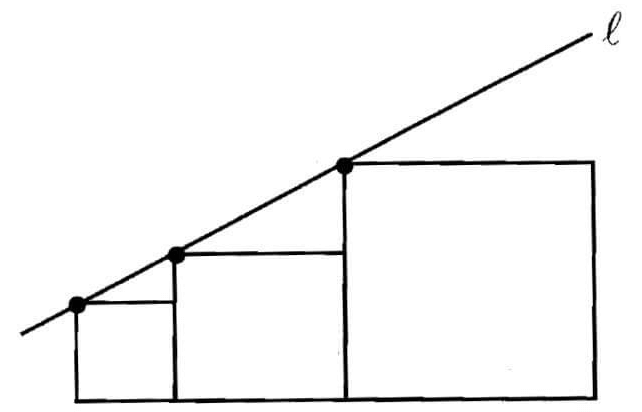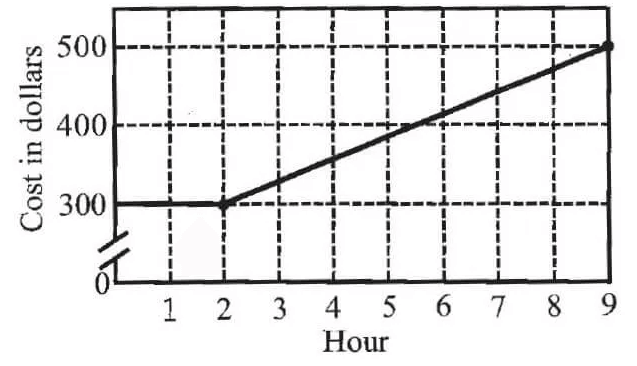RELATIONS AND FUNCTIONS CLASS 11 QUESTIONS
Question 1 :
On the set of natural numbers let R be the relation defined by aRb if 2a + 3b = 30. Write down the relation by listing all the pairs. Check whether it is
(i) reflexive (ii) symmetric (iii) transitive (iv) equivalence
Solution :
2a + 3b = 30
3b = 30 - 2a
b = (30 - 2a)/3 ==> 10 - (2a/3)
|
If a = 3 b = 10 - 2 = 8 (3, 8) |
If a = 6 b = 10 - 4 = 6 (6, 6) |
If a = 9 b = 10 - 6 = 4 (9, 4) |
|
If a = 12 b = 10 - 8 = 2 (12, 2) |
If a = 15 b = 10 - 10 = 0 0 is not natural number |
R = {(3, 8) (6, 6) (9, 4) (12, 2)}
(i) reflexive
The relation R is not reflexive, because it does not have the element (3, 3).
(ii) symmetric
The relation R has (3, 8) but (8, 3) is not in the set. Hence R is not symmetric
(iii) Transitive :
R is said to be transitive, if “a is related to b and b is related to c” implies that a is related to c
We cannot take pair from the given relation to prove that it is not transitive. Hence it is transitive.
It is not equivalence relation.
Let us look into the next example on "Relations and Functions Class 11 Questions".
Question 2 :
Prove that the relation “friendship” is not an equivalence relation on the set of all people in Chennai.
Solution :
Let A be the the set of all people in Chennai.
Reflexive :
a is not a friend of a. It is not reflexive.
Symmetric :
If a is a friend of b, then b is also a friend of a. Hence it is symmetric.
Transitive :
a is a friend of b, b is a friend of c, which implies that a be a friend of c or may not not be a friend of c. Hence it is not transitive.
So it is not equivalence relation.
Question 3 :
On the set of natural numbers let R be the relation defined by aRb if a + b ≤ 6. Write down the relation by listing all the pairs. Check whether it is
(i) reflexive (ii) symmetric (iii) transitive (iv) equivalence
Solution :
The sum of a and b will be lesser than or equal to 6, based on this condition let us list out the elements
R = {(1, 1) (1, 2) (1, 3) (1, 4) (1, 5) (2, 1) (2, 2) (2, 3) (2, 4) (3, 1) (3, 2) (3, 3) (4, 1) (4, 2) (5, 1)}
(i) reflexive
In the relation, we have (1, 1) (2, 2) and (3, 3) but we do not have (4, 4) and (5, 5). Hence it is not reflexive.
(ii) symmetric
The relation has the elements (1, 2) and (2, 1), (1, 3) and (3, 1), (1, 4) and (4, 1), (1, 5) and (5, 1).
(iii) Transitive
The relation has the elements (5, 1) and (1, 5), but it do not have the element (5, 5). Hence it is not transitive.
Hence it is not equivalence relation.
Question 4 :
Let A = {a, b, c}. What is the equivalence relation of smallest cardinality on A? What is the equivalence relation of largest cardinality on A?
Solution :
Let R be the relation
R = {(a, a)( b, b)(c, c)}
largest cardinality on A = A x A
Question 5 :
In the set Z of integers, define mRn if m − n is divisible by 7. Prove that R is an equivalence relation.
Solution :
(i) reflexive
m is related to m, then m - m = 0 which is divisible by 7. Hence it is reflexive.
(ii) symmetric
If m is related to n, then m - n is divisible by 7
If n - m is divisible by 7, then n is related to m.
Hence it is symmetric.
(iii) Transitive
m R n, then m - n = 7k --(1)
n R p, then n - p = 7t --(2)
k and t are some constants.
(1) - (2)
m - n + n - p = 7k + 7t
m - p = 7 (k + t)
Then m is related to p. It is transitive.
Hence Z is equivalence relation.
Question 6 :
A = {1. 2, 3, 4, 5, 7, 8, 9} and B = {2, 4, 6, 7, 9}, then how many proper subsets of A n B can be created ?
a) 16 b) 15 c) 32 d) 31
Solution :
Given sets are
A = {1. 2, 3, 4, 5, 7, 8, 9} and B = {2, 4, 6, 7, 9},
To figure number of proper subsets of any set, we have to use the formula
2n - 1
Here n is the number of elements.
A n B = {2, 4, 8, 9}
n(A n B) = 4
Number of proper subsets = 24 - 1
= 16 - 1
= 15
Kindly mail your feedback to v4formath@gmail.com
We always appreciate your feedback.
©All rights reserved. onlinemath4all.com
Recent Articles
-
Digital SAT Math Problems and Solutions (Part - 146)
Apr 18, 25 06:52 AM
Digital SAT Math Problems and Solutions (Part - 146) -
Logarithmic Derivative Problems and Solutions
Apr 16, 25 09:25 PM
Logarithmic Derivative Problems and Solutions -
Digital SAT Math Problems and Solutions (Part - 145)
Apr 16, 25 12:35 PM
Digital SAT Math Problems and Solutions (Part - 145)

